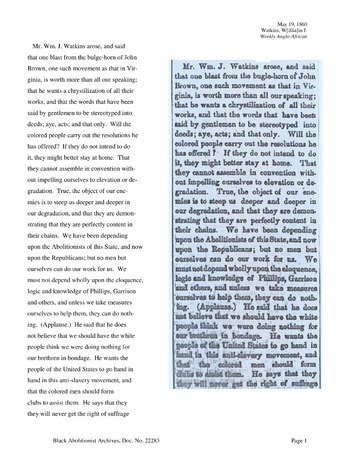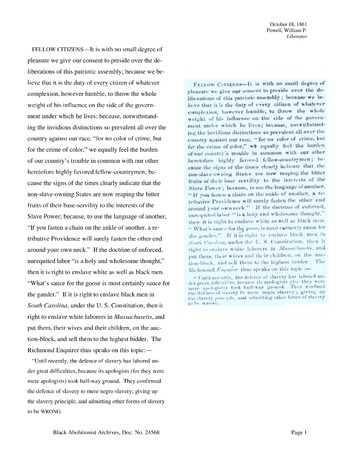(page1).jpg.jpg)
Title: Colored American - April 17, 1841
Speaker or author: editor
Newspaper or publication: Colored American (1837 - 1842)
The writer comments on the irony in the actions of those who band together as Republicans in Tammany Hall. They promise justice, equality, and fairness, yet deliver only corruption and prejudice.
Description of file(s): one scanned, two columned, newspaper page
(page1).jpg.jpg)
Title: Colored American - July 29, 1837
Speaker or author: editor
Newspaper or publication: Colored American (1837 - 1842)
The writer reports on the outcome of the Pennsylvania Convention, focusing mainly on the decisions regarding suffrage and constitutional amendments.
Description of file(s): one scanned, two columned, newspaper page
(page1).jpg.jpg)
Title: Colored American - June 17, 1837
Speaker or author: editor
Newspaper or publication: Colored American (1837 - 1842)
The writer expresses his belief that an upcoming convention in Pennsylvania to discuss an amendment to that state's constitution concerns disenfranchising the state's African American population.
Description of file(s): one scanned, two columned, newspaper page
(page1).jpg.jpg)
Title: Pacific Appeal - November 15, 1862
Speaker or author: editor
Newspaper or publication: Pacific Appeal (1862 - 188?)
The writer provides a brief overview of the outcome of two recent political elections
Description of file(s): one scanned newspaper column
(page1).jpg.jpg)
Title: Palladium of Liberty - May 22, 1844
Speaker or author: editor
Newspaper or publication: Palladium of Liberty (1843 - 1844)
The writer provides a brief commentary on the various political parties involved in this year's presidential election.
Description of file(s): one scanned newspaper column
(page1).jpg.jpg)
Speaker or author: editor
Newspaper or publication: Weekly Anglo-African (1859 - 1862)
The writer briefly points out one important result of electing Abraham Lincoln as president. He believes if Lincoln hadn't been elected, the slave trade would have spread across the country and become a "flourishing commerce."
Description of file(s): one scanned newspaper column
(page1).jpg.jpg)
Title: Weekly Anglo-African - February 18, 1860
Speaker or author: editor
Newspaper or publication: Weekly Anglo-African (1859 - 1862)
The writer offers his thoughts on what he believes is taunting from the New York Tribune in its attempt to stir up trouble between the northern and southern states.
Description of file(s): one scanned, two columned, newspaper page
(page1).jpg.jpg)
Title: Weekly Anglo-African - October 15, 1859
Speaker or author: editor
Newspaper or publication: Weekly Anglo-African (1859 - 1862)
The writer comments on a letter received from a newspaper correspondent on the subject of slavery, politics, and racial prejudice in New York state.
Description of file(s): one scanned, three columned, newspaper page

Speaker or author: Watkins, William J.
Newspaper or publication: Weekly Anglo-African (1859 - 1862)
The speaker encourages action for African American suffrage. He suggests that clubs be formed and that lecturers travel across the country to get support for this cause.
Description of file(s): PDF 2 page, 382 word document (text and images)

Speaker or author: Powell, William P.
Newspaper or publication: Liberator
The speaker addressed a recent essay noting that slavery had become morally and ethically understood in the U. S. as "Negro slavery." In this sense, only one form of slavery was "right" and any other form of slavery was considered "wrong." The government could then condone enslaving one segment of humanity and denounce and abhor enslaving any other. If slavery was admissible, he argued, then enslaving white people should be admissible as well. He also addressed the current conception that the slaves were content in their condition.
Description of file(s): PDF 6 page, 1,558 word document (text and images)



